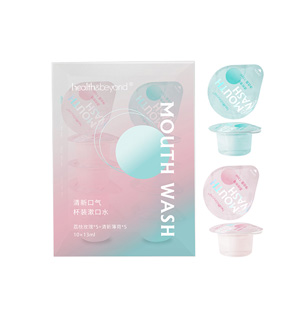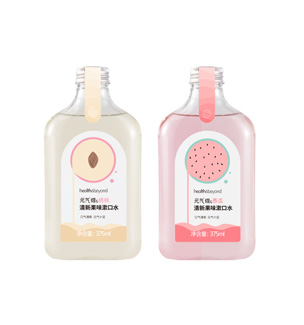Can I Brush My Teeth After Mouthwash?
Brushing and flossing are the foundation of good oral hygiene habits, but mouth wash can also be a useful addition, thanks to the many oral health benefits it must provide. If you have recently started using mouthwash, you may be wondering how you can incorporate it into your daily routine. Is it better to use mouthwash before or after brushing your teeth? What else can you do to promote oral health?
Benefits of Mouthwash
Mouthwash may be known for freshening your breath, but adding it to your daily oral care routine can provide many other benefits as well.
The American Dental Association (ADA) explains that mouthwash can reach areas that toothbrushes can't, which can help reduce the risk of tooth decay and gum disease. As the American Academy of Periodontology points out, untreated gum disease can lead to complications such as gum recession and tooth loss, but using mouthwash can help enhance prevention efforts.
Mouthwash achieves these oral health benefits by helping to control plaque, a thin film of bacteria that forms on the teeth. If plaque is not removed, it will eventually harden into tartar. the ADA reports that mouthwash can actually slow the formation of tartar as well.
When to use mouthwash?
When you first add mouthwash to your oral care routine, you may be wondering, should you use mouthwash before or after you brush your teeth? That's a good question, and it doesn't have an easy answer. Scientific research is limited, and reputable organizations offer different recommendations.
The Mayo Clinic recommends using mouthwash after brushing and flossing. However, the National Health Service (NHS) recommends against rinsing immediately after brushing, as this may wash out the fluoride in toothpaste. Instead, the NHS recommends using mouthwash at different times of the day.
The ADA states that you can choose to use mouthwash before or after brushing your teeth, depending on your personal preference. That said, mouthwash manufacturers may recommend orders based on the ingredients in their products, so check the label on the product to ensure maximum effectiveness.
Other ways to boost your oral care routine
Mouthwash can enhance your oral care routine but remember: it is not a substitute for regular brushing and flossing. Brush twice a day for at least two minutes each time to remove food debris and plaque from your teeth, and floss daily to clean between your teeth and along your gum line.
If you would like to further improve your daily oral care routine, consider the following tips.
Eat a balanced diet with healthy teeth.
Limit high-sugar foods and beverages, such as candy and soda.
Avoid frequent snacking.
Drink fluoridated water.
Replace your toothbrush every three to four months, or sooner if it seems worn or frayed.
Visit your dentist regularly for checkups.
While it is not a substitute for brushing and flossing, mouthwash can play an important role in your oral hygiene routine. It can help freshen breath, remove plaque and reduce the risk of tooth decay and gum disease. For help deciding whether to use mouthwash before or after brushing, consult your dentist.
The source is from here.
Benefits of Mouthwash
Mouthwash may be known for freshening your breath, but adding it to your daily oral care routine can provide many other benefits as well.
The American Dental Association (ADA) explains that mouthwash can reach areas that toothbrushes can't, which can help reduce the risk of tooth decay and gum disease. As the American Academy of Periodontology points out, untreated gum disease can lead to complications such as gum recession and tooth loss, but using mouthwash can help enhance prevention efforts.
Cup Mouth Wash
Mouthwash achieves these oral health benefits by helping to control plaque, a thin film of bacteria that forms on the teeth. If plaque is not removed, it will eventually harden into tartar. the ADA reports that mouthwash can actually slow the formation of tartar as well.
When to use mouthwash?
When you first add mouthwash to your oral care routine, you may be wondering, should you use mouthwash before or after you brush your teeth? That's a good question, and it doesn't have an easy answer. Scientific research is limited, and reputable organizations offer different recommendations.
The Mayo Clinic recommends using mouthwash after brushing and flossing. However, the National Health Service (NHS) recommends against rinsing immediately after brushing, as this may wash out the fluoride in toothpaste. Instead, the NHS recommends using mouthwash at different times of the day.
The ADA states that you can choose to use mouthwash before or after brushing your teeth, depending on your personal preference. That said, mouthwash manufacturers may recommend orders based on the ingredients in their products, so check the label on the product to ensure maximum effectiveness.
Vitamin C Mouth Wash
Other ways to boost your oral care routine
Mouthwash can enhance your oral care routine but remember: it is not a substitute for regular brushing and flossing. Brush twice a day for at least two minutes each time to remove food debris and plaque from your teeth, and floss daily to clean between your teeth and along your gum line.
If you would like to further improve your daily oral care routine, consider the following tips.
Eat a balanced diet with healthy teeth.
Limit high-sugar foods and beverages, such as candy and soda.
Avoid frequent snacking.
Drink fluoridated water.
Replace your toothbrush every three to four months, or sooner if it seems worn or frayed.
Visit your dentist regularly for checkups.
While it is not a substitute for brushing and flossing, mouthwash can play an important role in your oral hygiene routine. It can help freshen breath, remove plaque and reduce the risk of tooth decay and gum disease. For help deciding whether to use mouthwash before or after brushing, consult your dentist.
The source is from here.


评论
发表评论